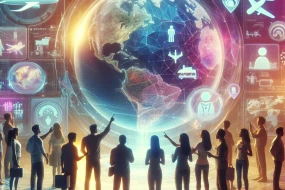
In an era where technology shapes every facet of our lives, the travel industry is undergoing a significant transformation. Big data, a term that has become synonymous with modern innovation, is at the forefront of this change. But what does big data mean for the average traveler? Simply put, it's about crafting a journey that's uniquely yours—tailored to your preferences, habits, and desires. This article delves into how big data is revolutionizing travel, making it more personal, efficient, and enjoyable.
Understanding Big Data in Travel
Big data refers to the vast volume of information generated every second from various digital sources. In travel, this data encompasses everything from flight bookings and hotel reservations to social media interactions and customer reviews. The sheer volume of data collected can be overwhelming, but when analyzed effectively, it offers deep insights into traveler behavior and preferences. For instance, airlines can predict peak travel times and offer personalized deals, while hotels can tailor services to meet the specific needs of returning guests.
Personalization: The Heart of Modern Travel
Imagine arriving at a hotel where the room temperature, lighting, and even the type of pillow are adjusted to your liking, all thanks to data collected from your previous stays. This isn't a futuristic fantasy—it's the power of big data at work. By analyzing past behaviors and preferences, travel companies can offer personalized experiences that enhance customer satisfaction. Personalized travel itineraries, custom recommendations for local attractions, and even dining suggestions based on dietary preferences are becoming the norm, all fueled by big data insights.
Real-World Examples of Big Data in Action
Consider companies like Airbnb and TripAdvisor, which leverage big data to provide users with personalized recommendations. Airbnb uses data to suggest properties that match a traveler's history and preferences, while TripAdvisor analyzes reviews and ratings to recommend attractions that align with a user's interests. Airlines like Delta utilize big data to optimize flight routes and improve customer service by predicting flight delays and offering real-time updates. These examples illustrate how big data is not just a buzzword but a practical tool enhancing travel experiences.
Common Mistakes to Avoid
While big data offers numerous benefits, there are pitfalls to be aware of.
1) Over-reliance on data without considering human elements can lead to impersonal experiences.
2) Privacy concerns are paramount; travelers must be informed about how their data is used.
3) Misinterpreting data can lead to incorrect assumptions about customer preferences. Companies must balance data insights with human intuition to ensure a genuinely personalized experience.
The Future of Travel: A Data-Driven Journey
As technology advances, the role of big data in travel will only grow. Predictive analytics will become more sophisticated, allowing for even more personalized experiences. Imagine a world where your travel itinerary is dynamically adjusted based on real-time weather changes or local events, ensuring you always have the best possible experience. However, with great power comes great responsibility. The industry must navigate ethical considerations, ensuring data is used responsibly and transparently.
Embracing a New Era of Travel
For travelers, the integration of big data means more than just convenience; it represents a shift towards a more connected and meaningful travel experience. By embracing the possibilities of big data, both travelers and companies can forge a new path in the world of travel—one that is as dynamic and unique as the people embarking on these journeys. As we move forward, the challenge will be to harness this power ethically and creatively, ensuring that the magic of travel remains alive for generations to come.































